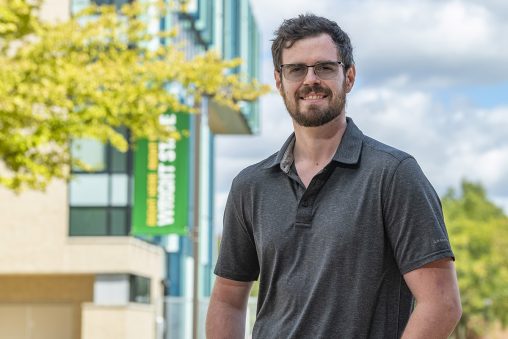
Matt Specht, a senior industrial and systems engineering major at Wright State, learned that small changes can have a significant impact on large-scale manufacturing during an internship with Honda.
Matt Specht, a senior industrial and systems engineering major in Wright State University’s College of Engineering and Computer Science, has always been interested in cars even at a very young age. So, when he was given the opportunity to intern with Honda, he was thrilled.
His interest really took off when he began buying and fixing cars and motorcycles as a hobby. This eventually sparked his interest in the manufacturing side of the automotive industry.
“Honda specifically is known to be one of the most consistent and reliable automakers, as far as quality goes, and I thought that would be the best place to expand my knowledge of the industry,” he said.
As an industrial systems engineer, Specht’s job is to improve quality and reduce inefficiencies at a company.
“They (industrial systems engineers) can be responsible for looking at a single manufacturing process and trying to cut out as much unnecessary time as possible, or looking at all the scrap parts made in a plant and coming with ideas on how to turn them into useful products,” he said.
He said that he finds this kind of work interesting because a seemingly small change can have a major impact when it comes to large-scale manufacturing.
“Just a few cents saved across hundreds of thousands of parts every year can add up fast,” said Specht.
As an intern with Honda, Specht worked as a quality engineer looking at trends in data about the cars that were inspected every day and fixing problems when cars were not up to the standards.
“I worked specifically on the Front Fascia team, which means working to improve the fit and finish of panel gaps and flushness issues on the front bumper, hood and fenders,” he said. “I also helped fix problems on the assembly line when things weren’t running well.”
In addition to honing his engineering skills, Specht said that one of the more critical things he leaned was the importance of “going to the spot.”
“When you have a problem in a manufacturing system, you must go down to the line to see for yourself what’s going on. Talking to people that work on the line can give some very valuable insight you might miss otherwise,” he said.
All and all Specht said that the experience interning a Honda was definitely worthwhile and that he would encourage other students to seek internship opportunities.
“Working at Honda was my first experience with manufacturing on such a large scale; other places I’ve worked have been much smaller operations,” he said. “I think I’ve gained a lot of insight into the differences between the two, and I would say that I enjoy the larger companies more. Seeing the effect small changes can have throughout a huge plant is fascinating to me. “
When seeking internship opportunities Specht learned that persistence and making connections pays off.
“Make sure you go to career fairs, talk to as many people as you can and get your resume to as many places as possible. It really is more about ‘who you know’ when it comes to finding jobs,” he said.
In addition to taking classes at Wright State, Specht works as a lab technician at Sinclair Community College, teaching precision machining classes.
“I really enjoy getting to work with students and teach them skills that can be used to get excellent jobs in the manufacturing field, which is in very high demand right now,” he said.

 Wright State names Rajneesh Suri dean of Raj Soin College of Business
Wright State names Rajneesh Suri dean of Raj Soin College of Business  ‘Only in New York,’ born at Wright State
‘Only in New York,’ born at Wright State  Wright State president, Horizon League leaders welcome new commissioner
Wright State president, Horizon League leaders welcome new commissioner  Wright State celebrates homecoming with week-long block party
Wright State celebrates homecoming with week-long block party  Wright State baseball to take on Dayton Flyers at Day Air Ballpark April 15
Wright State baseball to take on Dayton Flyers at Day Air Ballpark April 15 